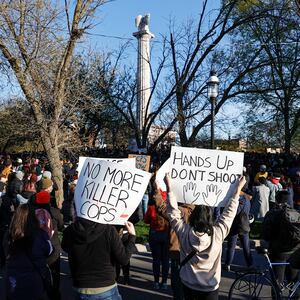Nearly a year after the death of George Floyd at the hands of Minneapolis Police, critics of police brutality have won some legislative victories. But in that same time, waves of anti-protest laws targeting people enraged at police violence have hit statehouses nationwide.
And now, just as jurors are set to begin deliberations in the murder trial over Floyd’s death, the crackdown on protesters is getting enshrined into law.
As racial justice protests saw renewed momentum following deadly shootings by police in Minnesota and Illinois this month, legislators in Minnesota and Florida considered bills that would introduce new penalties for protesters. The Minnesota bill would disqualify people from student loans, food programs, rent assistance, and unemployment benefits if they are convicted of a crime at a protest. The Florida bill, signed into law by Gov. Ron DeSantis on Monday morning, allows for sweeping crackdowns on protests, including new penalties for people arrested at them, and new immunity for people who hit protesters with vehicles.
Florida and Minnesota are hardly the only states eyeing anti-protest laws. Amid protests last year over Floyd’s death—estimated to be the largest demonstrations in U.S. history—35 states proposed at least 93 bills aimed at protesters. But Florida’s newly passed law, and Minnesota’s recently proposed bill, represent the vanguard of this legislation as protests enter their second year, and as rage at police killings is surging under a new administration in Washington.
Minnesota’s new bill was introduced on April 8, as the state prepared for new protests during the trial of Derek Chauvin, the Minneapolis police officer accused of murdering Floyd last year. The bill would become newly relevant three days later, when a Brooklyn Center, Minnesota, police officer shot and killed 20-year-old Daunte Wright during a traffic stop. Wright’s killing ignited new protests in Brooklyn Center and across the country. Police conducted mass arrests at those protests, detaining more than 100 people on Friday night alone.
If the bill passes, anyone convicted of a crime at those protests will be barred from receiving state benefits. (Its sponsor, state Senator David Osmek, did not immediately return a request for comment.)
That includes “any type of state loan, grant, or assistance, including but not limited to college student loans and grants, rent and mortgage assistance, supplemental nutrition assistance, unemployment benefits and other employment assistance, Minnesota supplemental aid programs, business grants, medical assistance, general assistance, and energy assistance.”
Many protesters arrested after Floyd’s death were college students, the Minnesota Daily previously noted.
Arrests at protests can be easy for police to rack up, even if the accused is not committing a crime. This weekend, multiple members of the media alleged mistreatment by police while covering protests in Minnesota. One, CNN producer Carolyn Sung, said she was arrested, cuffed, and processed in jail, despite repeatedly stating that she was a member of the media. While covering protests in Minnesota last May, another CNN crew was arrested live on camera.
Neither CNN crew was criminally charged, and both had the benefit of working for a highly visible media outlet. Other people arrested at protests might not be so lucky—and legislation like the newly passed Florida law would make it even easier to convict them.
The Florida legislation, billed as an “anti-riot” law, denies bail for people arrested at a riot (defined as a coordinated violent disturbance by three or more people that imperils people or property) until their first court appearance. It also increases sentencing for people convicted of rioting, makes it more difficult for cities to reduce their police funding, prohibits blocking roadways, and gives drivers civil immunity for driving through protesters. (Last year’s Black Lives Matter demonstrations saw a surge in drivers hitting protesters with vehicles—and rarely getting punished for it.) The law also makes it a second-degree felony to damage statues or monuments, including Florida’s highly controversial Confederate emblems.
Florida Democrats opposed the bill’s passage, arguing that its definition of “riot” was subjective, and likely to be applied unequally across different groups of protesters.
The Minnesota bill, meanwhile, might face more challenges passing the state’s Democratic-majority Senate, or receiving a signature from the state’s Democratic governor. Still, its presence in the state legislature is a warning to protesters of legal challenges to come, regardless of the verdict in Chauvin’s case.







